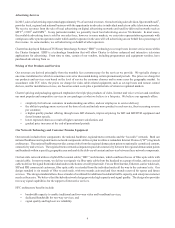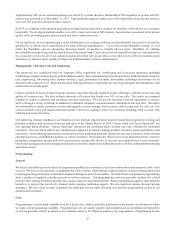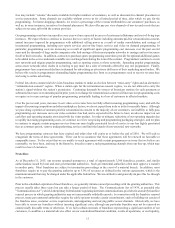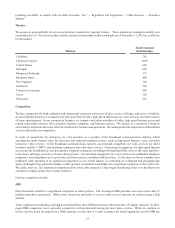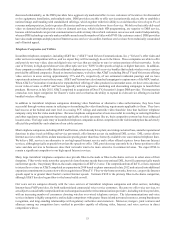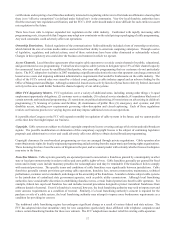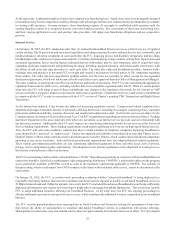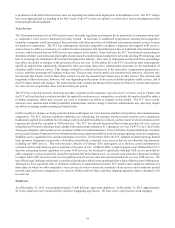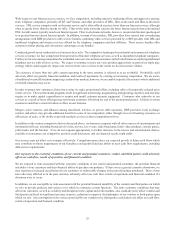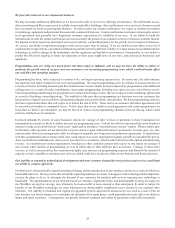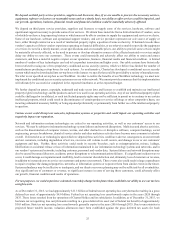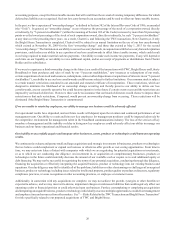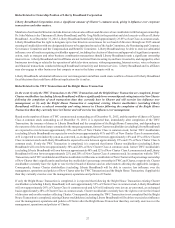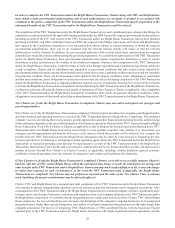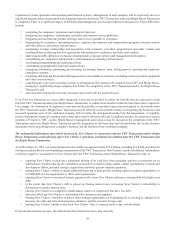Charter 2015 Annual Report Download - page 34
Download and view the complete annual report
Please find page 34 of the 2015 Charter annual report below. You can navigate through the pages in the report by either clicking on the pages listed below, or by using the keyword search tool below to find specific information within the annual report.19
is predicated on the belief that such state laws are impeding the nation-wide deployment of broadband service. The FCC rulings
have been appealed and are pending in the 6th Circuit. If the FCC orders are upheld, it could lead to increased competition from
municipal-provided broadband.
Voice Service
The Telecommunications Act of 1996 created a more favorable regulatory environment for us to provide telecommunications and/
or competitive voice services than had previously existed. In particular, it established requirements ensuring that competitive
telephone companies could interconnect their networks with those providers of traditional telecommunications services to open
the market to competition. The FCC has subsequently ruled that competitive telephone companies that support VoIP services,
such as those we offer our customers, are entitled to interconnection with incumbent providers of traditional telecommunications
services, which ensures that our VoIP services can compete in the market. Since that time, the FCC has initiated a proceeding to
determine whether such interconnection rights should extend to traditional and competitive networks utilizing IP technology, and
how to encourage the transition to IP networks throughout the industry. New rules or obligations arising from these proceedings
may affect our ability to compete in the provision of voice services. In November 2011, the FCC released an order (subsequently
upheld on appeal) that significantly changed the rules governing intercarrier compensation payments for the termination of
telephone traffic between carriers. That change resulted in a substantial decrease in the intercarrier compensation payments we
receive, and those payments will continue to decrease. The decreases over the multi-year transition will, however, affect not only
the amounts that Charter receives from other carriers, but also the amounts that Charter pays to other carriers. The schedule and
magnitude of these decreases, however, will vary depending on the nature of the carriers and the telephone traffic at issue, and if
the FCC makes further rule changes. We cannot predict with certainty the balance of the impact on Charter's revenues and expenses
for voice services at particular times over this multi-year period.
The FCC has collected extensive data from providers of point to point transport (“special access”) services, such as Charter, and
the FCC will use that data to evaluate whether the market for such services is competitive, or whether the market should be subject
to further regulation, which may increase our costs or constrain our ability to compete in this market. The FCC also recently
selected a new national local number portability administrator, and the change to that new administrator may adversely impact
our ability to manage number porting and related tasks.
Further regulatory changes are being considered that could impact our voice business and that of our primary telecommunications
competitors. The FCC and state regulatory authorities are considering, for example, whether certain common carrier regulations
traditionally applied to incumbent local exchange carriers should be modified or reduced, and the extent to which common carrier
requirements should be extended to VoIP providers. The FCC has already determined that certain providers of voice services
using Internet Protocol technology must comply with requirements relating to 911 emergency services (“E911”), the CALEA (the
statute governing law enforcement access to and surveillance of communications), Universal Service Fund contributions, customer
privacy and Customer Proprietary Network Information issues, number portability, network outage reporting, rural call completion,
disability access, regulatory fees, and discontinuance of service. In November 2014, the FCC adopted an order imposing limited
back-up power obligations on providers of facilities-based fixed, residential voice services that are not otherwise line-powered,
including our VoIP services. This order becomes effective in February 2016 and requires us to disclose certain information to
customers and to make back-up power available at the point of sale. In March 2007, a federal appeals court affirmed the FCC’s
decision concerning federal regulation of certain VoIP services, but declined to specifically find that VoIP service provided by
cable companies, such as we provide, should be regulated only at the federal level. As a result, some states have begun proceedings
to subject cable VoIP services to state level regulation, and at least one state has asserted jurisdiction over our VoIP services. We
have filed a legal challenge to that state’s assertion of jurisdiction, which is now pending before a federal district court in Minnesota.
Although we have registered with, or obtained certificates or authorizations from the FCC and the state regulatory authorities in
those states in which we offer competitive voice services in order to ensure the continuity of our services and to maintain needed
network interconnection arrangements, it is unclear whether and how these and other ongoing regulatory matters ultimately will
be resolved.
Employees
As of December 31, 2015, we had approximately 23,800 full-time equivalent employees. At December 31, 2015, approximately
60 of our employees were represented by collective bargaining agreements. We have never experienced a work stoppage.


